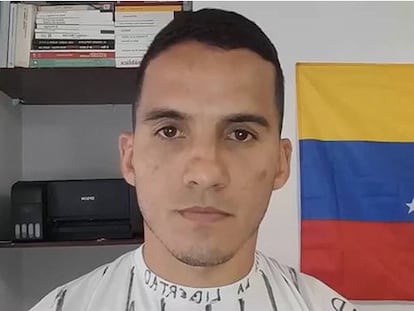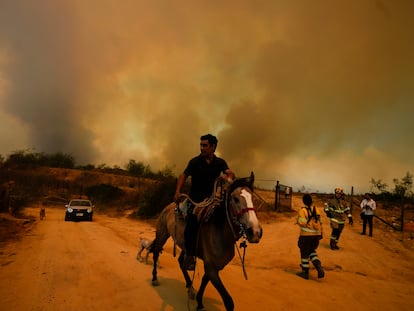Sara reunites with her children, who were stolen 40 years ago during Pinochet’s dictatorship
For the first time, the Chilean victim is able to hug her children, who were taken from her at birth and adopted off to a family in the United States. ‘I couldn’t believe it when they told me they were alive,’ she tells EL PAÍS
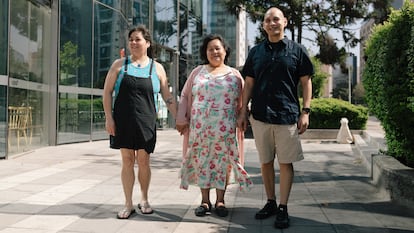

Sara Melgarejo was 25-years-old when she gave birth to her first child in a hospital in Santiago, Chile, on October 15, 1983. A woman with limited resources, she was alone in the delivery room, because her partner was working. A nurse took the baby away from her before the new mother could hold him, or even hear him cry. She was then informed that he was stillborn. Naturally, she was devastated.
A year or so later — on November 19, 1984 — Melgarejo gave birth again. This time, to a girl. The health personnel immediately took the baby away from her. Then, the tragic news was repeated: the baby hadn’t survived.
While Sara mourned her first loss, far away, in a town in Virginia, Rose Hiebart and her husband, Steve Ours, received the call they had been waiting for. Due to health issues, they couldn’t have children. So, they decided to adopt. They took a six-week course at an adoption agency in Washington, D.C., where they met a couple who had adopted a little boy with dark skin and brown eyes of Chilean origin. They wanted to do the same. The agency put them in touch with a Chilean social worker. She told them about a poor woman who had given her two-week-old son up for adoption. That woman was Sara Melgarejo.
The adoption papers took a couple of months to draw up and — after paying $20,000 — the American couple traveled to Chile for a week, to pick up the new member of the family. They called him Sean. A year later, the agency contacted Hiebart again, to inform her that Sara and her partner had become parents again and were giving the girl up for adoption. Hiebart happily accepted. Sean would have a little sister, Emily. The liaison was, once again, the social worker and the procedure cost $16,000. Both babies were registered in Chile’s Civil Registry Service and the adoption was processed by the Fourth Court of Santiago.
It took 40 years for Sara to meet her children. The reunion happened on Sunday, February 18, at Santiago airport. She embraced two English-speaking adults. The search for Sean and Emily’s adoptive mother was crucial to uncovering the lie. Melgarejo is one of numerous women who had their babies stolen during the dictatorship of Augusto Pinochet (1973-1990), although investigations reveal that the practice extended beyond that period of time.
The first complaints came to light in 2014, after a report by the Chilean investigative media outlet CIPER. The then-magistrate Mario Carroza began a judicial investigation into irregular adoptions abroad that took place between 1970 and 1999. She found that there were hundreds of such cases.
“We reached a figure of up to 20,000 children. What we had to see was whether they left [the country] irregularly or not,” Carroza explains. He is now a member of Chile’s Supreme Court. The investigations are currently being led by Jaime Balmaceda — a minister of the Court of Appeals of Santiago — who has stated that, in the past, Chilean legislation was very permissive regarding the adoption of children by foreigners. The regulation of these kinds of adoptions coincided with the end of the military dictatorship.
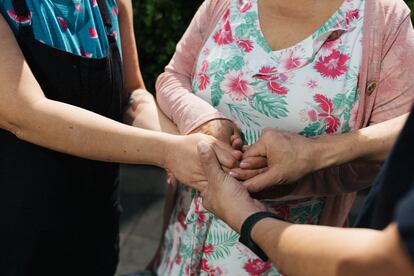
Last week, the National Institute of Human Rights (INDH) published its 2023 report, which mentions the cases of “child abduction and illegal adoptions” being looked into by Minister Balmaceda. Until April 2023, 1,000 of such cases have reached the judiciary: 757 are being processed, while 243 have concluded. This is according to information provided to the INDH by the Supreme Court’s Office for the Coordination of Human Rights Cases. To date, no convictions have been made.
In search of their biological mother
Sean and Emily’s adoptive parents always spoke openly to them about their origins. It made sense to them that their biological mother would have wanted them to have a better life in the United States, rather than under the Chilean military dictatorship. As teenagers, however, they wanted to know more. They went to the Washington adoption agency, but its officials tried to dissuade them from searching. They were only given the option of writing a letter to Sara. Eventually, the kids decided to move on with their lives.
“The agency got angry with me because they didn’t want the children to look for their parents. They told me I shouldn’t encourage them,” Hiebart — their adoptive mother — recalls, in a conversation with EL PAÍS by phone from North Carolina, where she currently lives with her second husband.
The children gave up, but Hiebart didn’t. In 2002, she hired a private detective in Santiago to find Sara Melgarejo, the name that appeared on her adoption certificate. The effort, however, was unsuccessful.
For many years, the American woman read articles about irregular adoptions in Chile. Years ago, one of the pieces detailed Carroza’s investigation and mentioned social worker Telma Uribe, the same person who had managed her adoptions. The text also indicated that the Human Rights Brigade of the Investigative Police (PDI) had seized documents in Uribe’s house, including ones from the DC-based adoption agency. “That was what really opened my eyes. The children could have been stolen,” says Hiebart, 71, now-retired. That concern — which she only shared with her ex-husband and her current husband — kept her digging in the press for years, until she found the nonprofit organization Connecting Roots.
In July 2023, Hiebart called Tyler Graf, who founded Connecting Roots after learning that he was taken from his Chilean parents and irregularly adopted out to his American family. Since then, Graf — a firefighter by profession — has dedicated himself to helping fellow victims. Hiebart told him her story and he responded: “When you’re ready, tell them.” The woman wrote an email to Sean and Emily with all the information she had collected so far, accompanied by links to the news articles. “If you want to do the search, you may find that your biological mother [is still] alive. Or not. You choose what you want to do.” They decided to search.
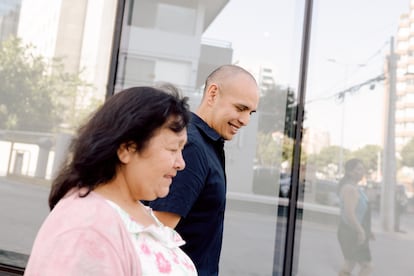
Two months later, in September, Barbara Vergara — from Connecting Roots — found Malgarejo’s sister through social media. She asked her to notify Sara that she had important information concerning events that had occurred in 1983 and 1984, to give her a clue about where she was going with all of this and to rule out any possible scam. Sara got in touch.
In a Zoom call, Vergara introduced herself and revealed the true destiny of her children. Sara was convinced that they were dead. “She opened her eyes in disbelief, but in her heart and soul, she wanted it to be true,” Vergara recalls. The process, of course, included DNA tests of all those involved, which ultimately showed that they were family.
A new reality
Sara and her two children saw each other for the first time in 40 years via a video call at the end of last year. Juan Luis Inzunza — from Connecting Roots — also participated in the meeting to translate from Spanish to English and vice versa. But the meeting wouldn’t remain virtual. Last Sunday, Sara was able to hug and kiss her children. Sean and Emily traveled to Santiago to meet her and stay with her for a week, in a reunion facilitated by the foundation. “I had blocked everything out. What happened at that time hurt me a lot. I couldn’t believe it when they told me they were alive,” Sara cried.
“She looks so much like me. He does, too,” their emotional mother declared, in a hotel room in the Chilean capital on Monday, February 19. Indeed, Emily — who has the Chilean flag tattooed on her arm — is the mirror image of her mother.
Sara broke up on bad terms with the father of her two children as a result of the supposed deaths. They don’t keep in touch, nor does she want me to meet him. “They’re my children,” she says, with determination. After those dark years, she met her current partner, with whom she has three children and two grandchildren, who live outside of Santiago.
Since she was a young girl, Sara — as shy as she is sweet — has worked as a nanny. When the children she cares for grow up, she’s hired to work in other houses. “They’ve been my therapy. My little ones,” she sighs. Upon learning the truth, Sara describes that she felt anger, helplessness and pain. “Very great harm” had been done to her. But now, looking at her little adults, everything is joy.
The joy of the reunion is shared by Sean and Emily, who constantly caress their mother’s hand. “The Zoom call we had reinforced that all of this felt real. It wasn’t just a fantasy: we were seeing Sara,” says Sean, the father of two teenagers, who also appeared on the video call to meet their biological grandmother. Emily confesses that she was deeply upset when she found out what happened: “They told her a lie when she signed those papers — she thought they were our death certificates. It’s frustrating that they denied us having our mother all these years. Before, everything was anger… but now, I feel totally happy that we can start this relationship.”
Sean and Emily are warm and open. They want to obtain Chilean citizenship — which they are entitled to — and return as many times as they can to the country, to make up for lost time. Next visit, they’ll meet their extended family. And they have a place to stay: for the past month, Sara has been preparing her house in San Bernardo, in the southern area of Santiago, so that she can receive them. She bought a new bed, mattresses and blankets, so that everyone can have their own room. She also has land in Temuco — about 400 miles south of the capital — where she wants to build a house with her partner. She’s excited, thinking about being able to host her oldest children there in the future.
“My daughter sometimes tells me things in Spanish,” Sara whispers, in a moment when her children are out of earshot. “She tells me: ‘I love you, mommy.’”
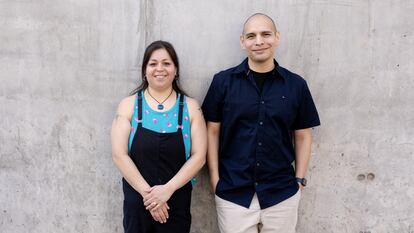
Translated by Avik Jain Chatlani.
